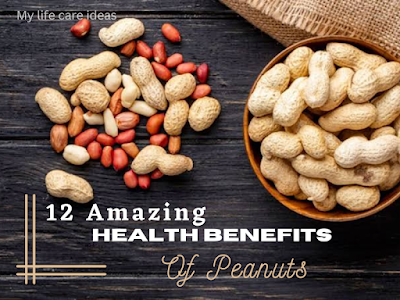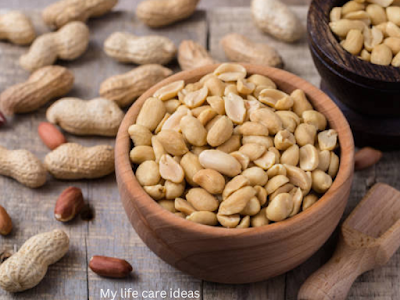Peanuts
The most delicious snack of the winter is
peanuts. All around the world, they are called a variety of things, including goobers,
earthnuts, and groundnuts. A type of legume with South American roots is the
peanut. Winter is the finest season to eat since you may enjoy hot peanuts
straight from the oven while curled up under a blanket. Since they are so high
in proteins, lipids, and vitamins, peanuts are exceptionally nutrient-dense.
You won't believe it, however, peanuts are the perfect savory snack with
numerous health benefits. There are several benefits of peanuts, from improving memory
to assisting with weight loss.
What Are The Health Benefits Of Peanuts?
Peanuts offer a variety of product uses, from
delicious sauces to desserts, and are low in sodium and rich in vitamins and
minerals.
By lowering blood sugar levels, reducing
inflammation, and offering a wealth of vitamins and minerals including iron,
folate, and vitamin E, peanuts can improve cardiovascular health. They are
vegan, gluten-free, and packed with protein, which helps with weight control
objectives by reducing overeating and unhealthy snacking.
Nutrients are widely present in peanuts. They
are nutritious and good for you.
12 Peanuts Health Benefits
So let's understand what are the other benefits
of it!
1- Reduce Heart Disease:
One of the largest reasons of death on the globe
is heart disease.
Consuming peanuts and other nuts may prevent
heart disease, according to observational research. These advantages are
probably the outcome of several reasons.
Notably, there are several heart-healthy
elements in peanuts. These consist of oleic acid, magnesium, niacin, copper,
niacin, and several antioxidants, including resveratrol.
2- Makes Bones Healthy:
Many of the bones in your body begin to weaken
as you get older. Therefore, you must concentrate on consuming wholesome and
nutrient-rich food selections like Peanuts while your bones fear losing their
flexibility and power.
Phosphate and manganese are abundant in
peanuts. These vitamins and minerals, along with other critical components
found in peanuts, help in maintaining the intensity of your bones as you age.
3- Makes Skin Healthy:
Want flawless skin? You can achieve it using
peanuts! Niacin and vitamin B3 are abundant in peanuts, which help prevent
wrinkles and a variety of skin conditions. Niacin helps to lessen fine lines,
creases, and hyperpigmented spots, according to a study that appears in the
journal Dermatologic Surgery.
4- Benefits Of Peanuts For Hair:
Another advantage of peanuts is that they can prevent
hair loss. This is so that the body can produce better collagen when vitamin C ranks
are high. Collagen keeps the hair tissues in a sound and healthy state. Omega-3
fatty acids, which are known to strengthen hair and give it shine, are also
abundant in peanuts.
Scientific studies connecting peanuts to hair
development are scarce. Given that they are high in protein and all the
essential amino acids, peanuts may be a useful addition to a diet for hair
development.
5- Best For Children's Health:
Children soon become drawn to harmful snacks.
There is one strategy to keep your kids away from those junk foods in today's
world where the media is very helpful in showing the unhealthiest of things in
the most appealing packaging.
These nuts make wonderful and crunchy snacks and aid in a child's early development and growth because they are a good source of proteins and essential amino acids.
6- Boost Energy & Memory Power:
A snack that is high in energy is peanuts. Peanuts
are a fantastic seed of fiber and protein. They aid in the energy conversion of
carbs. Peanuts make up 25% of the total calorie intake. They provide the body with
a great amount of energy and also boost the level of memory power.
7- Prevents Weight Loss:
Despite their high-calorie content, peanuts
help people lose weight rather than gain it. Foods high in energy include
peanuts. They may therefore help you eat fewer calories eventually in the day
if you eat them as a snack. When ingested as a snack rather than with a meal,
peanuts increased feelings of satiety.
This might enable weight loss in the long
term run. According to some research, increasing nut consumption may help with
weight control and is not linked to increased body weight gain.
8- Improves Blood Sugar Level:
Finding something to eat can be difficult if
you have diabetes. Because they do not cause a blood sugar increase, peanuts
can save your life. Additionally, the magnesium in peanuts enhances your body's
sensitivity to insulin, which further aids with blood sugar regulation.
9- Good For Eyes:
Peanuts are good for vision because they help
in treating night blindness. Zinc helps in the shifting of an enzyme in our body
that helps cultivate Vitamin A, which is useful in dealing with night
blindness.
10- Contains Healthy Fats:
Every diet needs fatty acids to function
properly. Polyunsaturated and monounsaturated fatty acids, a healthy form of
fat, compose a majority of the fats in peanuts. Blood cholesterol ranks can be put
forward by consuming saturated and trans fats. As a result, the chance of
stroke and heart disease is likely to decrease.
Peanuts contain a modest amount of saturated
fat. Compared to unsaturated or polyunsaturated fat, saturated fat is less
healthy. Cardiovascular disease and excessive saturated fat are linked by
doctors. Therefore, it is advisable to consume peanuts in moderation for
maximum health advantages.
11- Fight With Inflammation:
The majority of the beneficial fats in
peanuts, which are also present in olive oil, come from oleic acids. This
specific acid found in peanuts helps your body's cells fight inflammation
as well as other free radicals.
12- Reduce the Risk Of Cancer:
In-depth studies have revealed that eating
peanuts can help in the prevention of cancer. Peanuts are a great source of
protein and vitamin E, both of which reduce the chance of developing cancer.
These legumes include a high source of antioxidants
such as resveratrol, which helps prevent cancer by blocking off the blood flow
to your developing cancer and slowing the growth of cancer cells.





.png)
0 Comments